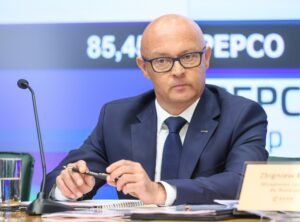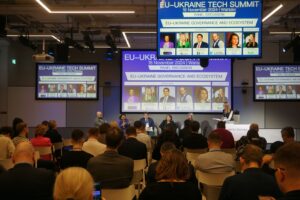During the conference panel „Future technologies. Electromobility” in the Presidential Palace on 17 January 2018 it was discussed about the benefits of electromobility development for the country – writes Agata Rzędowska, editor at BiznesAlert.pl.
The course of the discussion was supervised by Jacek Pochłopień, editor-in-chief of Wprost, and the panellists were: prof. Maciej Chorowski – Director of the National Centre for Research and Development, Włodzimierz Gołębiowski – CEO of Born Electric start-up, Dr Dariusz Michalak – Vice President of the Management Board of Solaris Bus & Coach S.A., Lucjusz Nadbereżny – Mayor of Stalowa Wola, Jacek Pawlak – President of Toyota Motor Poland. Representatives of various circles shared their thoughts on the benefits for the Polish economy, science, industry, and society related to the development of electromobility.
The window of possibilities may close
Prof. Maciej Chorowski spoke about the fact that we have a unique opportunity for development owing to electromobility. He pointed out that we have a scientific potential that will allow us to be successful, but the „window” that has opened may close in a moment. If Poland does not intensify its efforts, does not select specific areas where it has the ambition to succeed, it will not manage to become known on the international market. Chorowski talked about the time horizon of a year or at most two years when Polish companies in the area of electromobility may become known. According to Chorowski, we are at a time when the mobilisation should be maximised in order to be successful and to profit from it in the future.
Asked by Jacek Pochłopień about what we need to successfully produce an electric car, Dariusz Michalak from Solaris Bus & Coach said that, being successful in the production and sale of buses of Solaris brand, he could say that this effect had consisted of more than 20 years of hard work. A product that is accepted and tailored to the customer’s needs is a distinguishing feature on the market. Solaris buses fulfil such criteria. Michalak mentioned that electromobility for Solaris had begun in 2001, when the production of trolleybuses started. The next step is 2011 and the production of the battery bus. The chance of success exists on the Polish brand electric cars market, but as the expert said, it must be based on solid pillars and trust in the created brand.
Polish electric car?
The panel leader asked Jacek Pawlak associated with Toyota Motor Poland about the opportunities and possibilities of creating a 100% Polish electric car. According to the expert, the chances for this exist, as demonstrated by Toyota’s actions on the Polish market so far. He said that we have facilities and potential. However, according to Pawlak, starting a production line from which 200 or 300 thousand vehicles will be completed annually is no longer that easy. And it is necessary to think about such production volumes in order to achieve success, then you have to sell these cars at a profit. The challenge will be to ensure component manufacturing costs that are competitive with those of global suppliers. Pawlak also spoke about the fact that work on the car starts with designing the floor platform, and in his opinion it takes 3-4 years. This will guarantee the development of a safe and modern car. Pawlak believes that Polish manufacturers should look for niche technologies and maybe instead of producing and selling electric cars in hundreds of thousands of units, they should produce components in millions.
Jacek Pochłopień asked Włodzimierz Gołębiowski from Born Electric about how the work on an electric kart was done and whether it would be possible to work on an electric car in a similar way. Electromobility, according to Gołębiowski, is not only ecological but also supposed to be „cool,” which is why Born Electric is where there is fun and racing. He believes that with a budget of EUR 20 to 40 and within 2 to 3 years an electric city car may be built in Poland. It will not be a mass car, it will be a typical urban car. The panellist wondered how to popularize electromobility before Poles switch to electric cars. According to him, attraction of athletes to Poland, maybe perhaps Formula E races, creation of space for cooperation for start-ups and test tracks also for autonomous vehicles are the ways in which Polish companies wishing to produce electric cars can succeed.
Lucjusz Nadbereżny spoke about electromobility from the perspective of the city, where 30 percent of the city transport rolling stock will soon become electric. He added that urban electromobility is not only electrical buses, which were accepted by passengers with big enthusiasm, but maybe in the future also electrified city bikes. Stalowa Wola is a city with the potential to develop precisely these areas of the industry. He talked about the fact that modern local government needs modern public transport. It is a tool to create the best living conditions for the inhabitants. At the beginning, 10 electric buses and 5 chargers will be delivered to the city and Solaris was chosen in a competition to implement these plans. There will also be a network of modern stops, i. e., the whole system needed to ensure that the inhabitants have good conditions to live in the city, as said by Nadbereżny.
Other fuels and innovations
In the further part of the panel, the participants added threads related to the development of the alternative fuels market, including hydrogen and photovoltaics, the future of energy storage and engineering human resources for the conducted undertakings. They agreed that electromobility forces us to look at various phenomena. The theme of niches, in which native companies can develop production, reappeared. After the panel discussion, President Andrzej Duda, who took part in the conference, got acquainted with the results of Polish companies’ work. Buses, commercial vehicles, and bicycles from Polish manufacturers were presented in the courtyard of the Presidential Palace.
The last element of the conference was networking, i. e. the time for free exchange of contacts and experiences between the invited guests. The selection of conference participants suggests that the exchange of experiences and contacts will bring good results. The organizers made sure that component manufacturers, representatives of start-ups, research institutes, scientists, and potential investors appeared.








